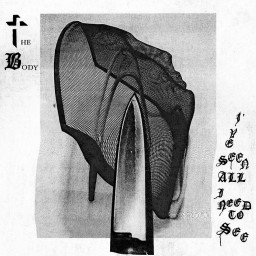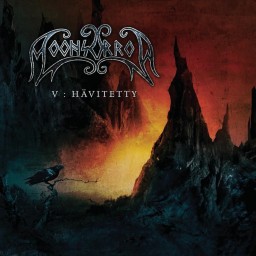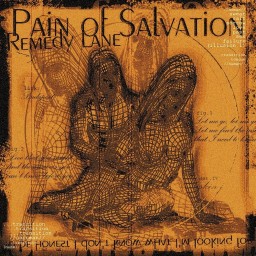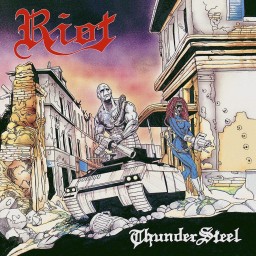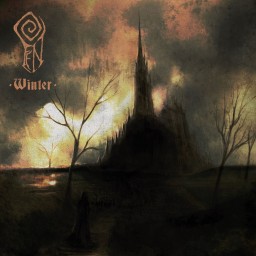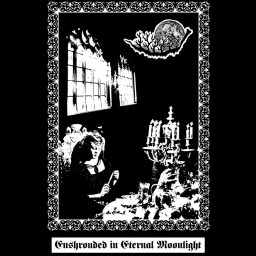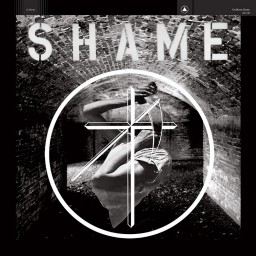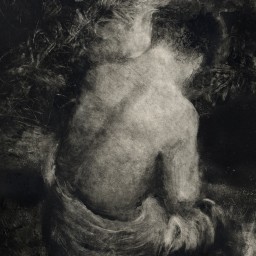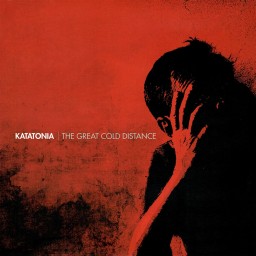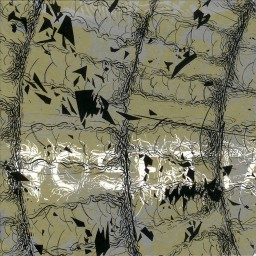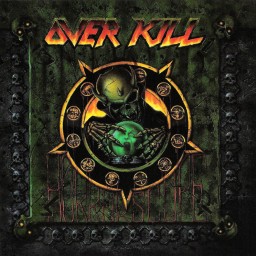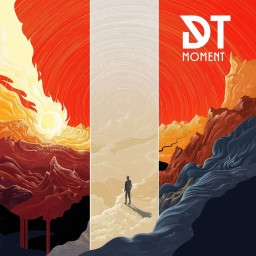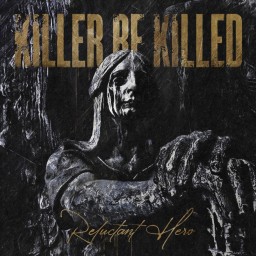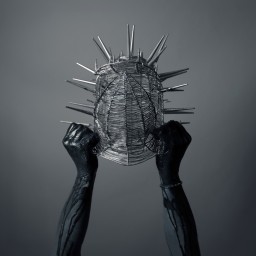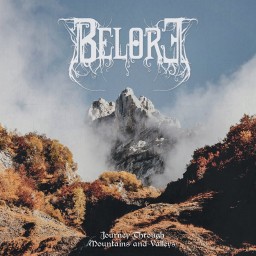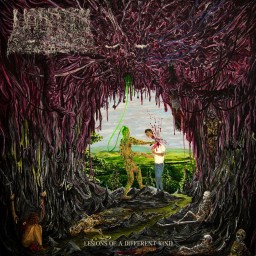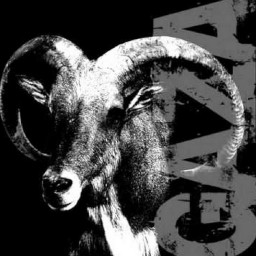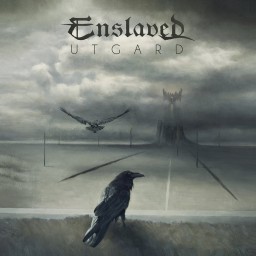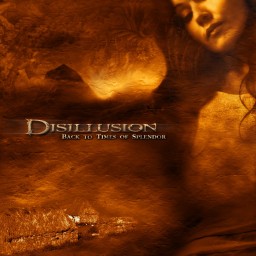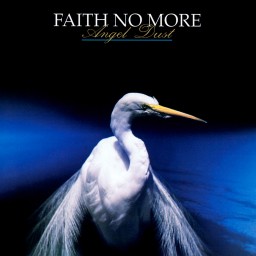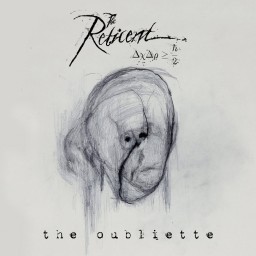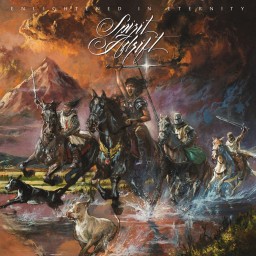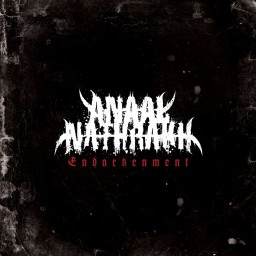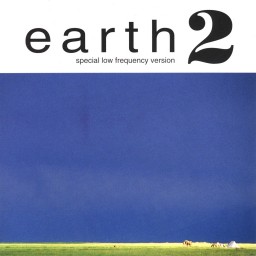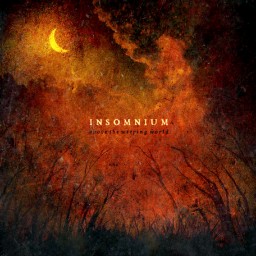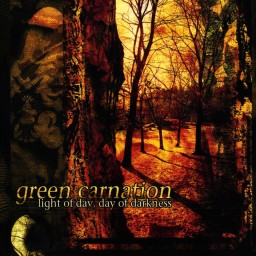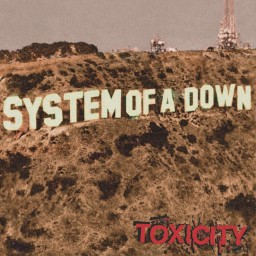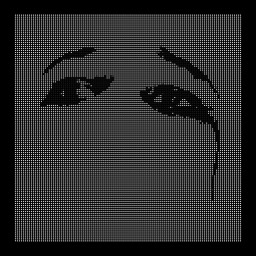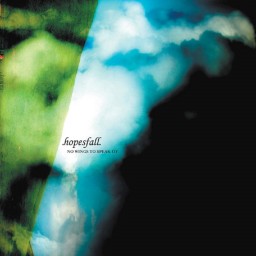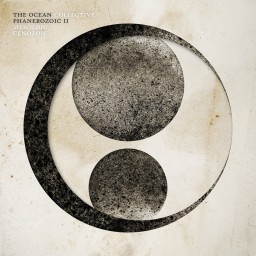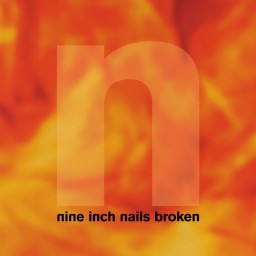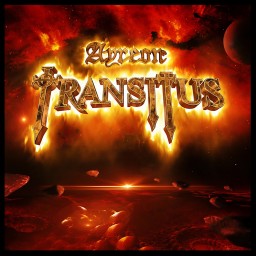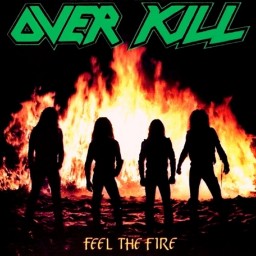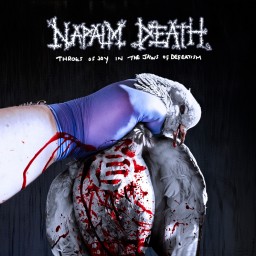Saxy S's Reviews
The continued critical success for the duo of The Body is utterly perplexing at this point. This group has been delivering punishing drone metal at a speedy pace for the last ten years and here we have yet another new album from the group, released at the beginning of the year 2021 and I did enjoy this, although I can certainly tell that this record is not tailored for everyone.
For starters, this is not a metal album. I think that the tag of this being metal is more indicative of where the band has been; deriving many of its sounds from industrial and sludge metal. This album is far more electronic, perhaps further exemplifying the industrial tag, but fewer guitars than ever before. Chip King's absurd vocals are still present to the point of inaudibility as the rest of the instrumentals collapse around you in a blown out mix of (and this is a compliment) disgusting plunderphonics and mix clipping. Now, under most circumstances, this would be a net negative, but it is quite obvious that The Body made this album sound this way intentionally. It almost compares almost too well to an album from Lingua Ignota.
Unlike Lingua Ignota, the lyrics and themes don't take very much precedent, but they serve the same purpose. They are shredded beyond repair and feel as if you are being pulled down into the depths of Hell itself. The instrumentals are obtrusive and gross, layered in an almost ridiculous amount of feedback and wub effects and together, they create a homogenized mess that is as hard to pin down as you might expect, but it is immense and brimming with atmosphere.
Now on the downside, I have never been the biggest fan of Drone music even on its best days, so while the album is quite brisk for a drone album (around thirty-eight minutes), I still cannot deny that the constant repetition of ideas from track to track can become redundant, especially when you get to those five minute tracks like "A Pain of Knowing", "The City Is Shelled" and "Path of Failure". In addition, while I do appreciate the atmosphere that is on display, the blown out electronics in the mix is a little overwhelming for my taste. I liken it to the kind of shit you get out of a Bubblegum Bass record, but at least they have the decency to toss in a cleaner passage every once in a while.
But that would be taking away from the overall appeal of an album like this. So while The Body have found a sound that speaks to them, and they can do it without collaborators, they can make this obtrusive mix work. However, having never been a big fan of these sounds in the first place, I do have to be a little bit tentative in my recommendation. It really isn't for me, but it does sound good for what it's worth, and that's all I need to see.
Genres: Drone Metal
Format: Album
Year: 2021
Moonsorrow are among an elite group of artists across any genre of music that I can honestly say have shown great maturity into their later years. This group around the mid 1990s as a fairly decent pagan black metal band who occasionally delved deep into soaring song construction associated with the atmospheric side of black metal. Of course, it was only a matter of time before Moonsorrow refined their sound and gave it more progressive elements and would essentially place themselves firmly in my wheelhouse when it comes to my favourite styles of black metal. What I am basically saying is...my very unique appreciation for black metal is attributed in large part thanks to Moonsorrow.
I discovered them in 2011 with the record Varjoina kuljemme kuolleiden maassa which I view as the culmination of their sound, and one of the best albums in all of that year. Most of the general consensus among fans is that Verisäkeet is the tops, but very few people talk about V: Hävitetty. This record is a daunting one; only two tracks, but both eclipse twenty-five minute runtimes. Of course, most Moonsorrow fans should not be surprised by this since they have always engaged in ten minute plus endeavours. And with this? I feel like Hävitetty is more of an experimental project rather than one that Moonsorrow would continue down. A very good experiment mind you, but not one that I see as the pinnacle of Moonsorrow's discography.
So to start, let's talk about these song forms. The first track is actually broken up into two distinct sections: "Jäästä syntynyt / Varjojen virta" breaks right around the twelve minute mark. The first is slow and drawn out for quite some time, only truly growing into a black metal mold around the seven minute mark. The buildup is tremendous and each of the following transformations hit like a freight train! The soaring melodies in the guitar complimented by some very prominent bass allow for this track to become a true "epic"; you will not even notice where all the time has gone.
The second track, "Tuleen ajettu maa" is far more straightforward and may be seen as the lesser of the two tracks. With it being only one continuous idea, it can become repetitive if you are not listening in the right places. The main melodic passage is passed around the ensemble and is transformed through a number of different time signatures and stylistic changes; it's actually quite impressive. There are some classical composers who cannot hold onto a melodic theme for that long! And just like the opening of the first track, the gradual cool down from the massive cataclysm of sound ends the album the same way that it began and it helps bring these two separate ideas together without ever having to cross reference each other.
There are a couple of problems. First and foremost, the mixing of the percussion is quite lackluster. Most notably during any softer portions when Marko starts incorporating more lower toms and kick drum, they seem to pierce through the mix and clip over any clean guitars or synths that might be playing at the time. The only other big issue that I have is the incorporation of these folk elements. First and foremost, this is a black metal record with folk elements, rather than a unification of the two. Perhaps a little bit ironic since one of my favourite records of all time is Ashes Against the Grain, but it has been dealt with by groups such as Saor later on, and I can't help but feel a little underwhelmed.
That being said, if you want an album that has stood the test of time by combining the elements of atmospheric black metal, progressive metal and folk together, then Hävitetty might be the album for you. The sounds on display here are some of black metal's finest. This truly feels like the warm embrace of a fire while the rest of the world around you is entrenched in the coldness of winter. It might not be as mature as Varjoina kuljemme kuolleiden maassa, but a step in the right direction nonetheless.
Genres: Folk Metal Viking Metal
Format: Album
Year: 2007
Pain of Salvation are one of progressive music's most consistent groups of the 21st century. My introduction to this group was in 2010 with Road Salt One and while I certainly have been given no reason to dislike it, it is a project that I don't return to all that much. It's a pleasant experience in which the progressive elements are prominent and robust, but it is severely lacking in connectivity.
That changed quite recently with the release of their 2017 album In the Passing Light of Day, which saw the band reach their fullest potential during the 2010s and create something that made sense given the timbre of this music, as well as each members musical proficiency.
Now why bring all of this up? Well, in going back and listening to most of Pain of Salvation's older discography, I found that not a lot of it stands out. They have always been a 6 to a 7 our of 10 in which albums had excellent moments, but failed to keep me engaged for a full album runtime. This is especially prominent when most of these albums run at least an hour.
And so, Remedy Lane is the bands most commercially successful and praised album and I understand why. The band has a sound that is heavy, but still restrained enough that it could be accepted by a progressive rock crowd as well; since I am Tool fan, this is a selling point for me. As for the music itself? Songs like "Ending Theme", "Undertow" and "Second Love" are subtle with their progressive output and can be quite beautiful, while the tunes "A Trace of Blood" and "Rope Ends" are far more direct. The interweaving of ideas on "A Trace of Blood" are composed well as the listener is allowed to engage with the themes that are on display.
It is also noticeable that Pain of Salvation have not truly evolved over the last twenty years. Many of Pain of Salvation's tried and true -isms from this album are still on display even with records today like PANTHER; three over two (or vice versa) rhythms, some awkward vocal harmonies and a very lackluster scream that just manages to creep its way in on the closing track "Beyond the Pale". They also know how to craft hooks as prominent as "Meaningless" and "Full Throttle Tribe" would become later. The songs "A Trace of Blood", and "Undertow" show what this band is capable of and that it would be possible for them to make a truly great record if they stopped writing songs like "Rope Ends" and "Chain Sling".
My final piece surrounding this album (and all of Pain of Salvation's discography for that matter) is that they paved the way, not intentionally towards Djent music. The herky-jerk nature of these rhythmic instrumentals is unmistakable by today's standards and can be heard in groups such as Animals As Leaders today. Having never been a big fan of Djent in the first place, I will admit that at least this record still has some decent songwriting capability associated with it. I assume that this record would have been received more fondly in 2002 as opposed to twenty years later. But since I can only review based on personal experience, I found Remedy Lane to be a very good progressive rock/metal album with significant cultural impact, but the impact that it did make is not my cup of tea.
Genres: Progressive Metal
Format: Album
Year: 2002
Power Metal is a genre that I hold in high regard given it's significance within my lifetime and my growth and appreciation of heavy metal as a whole. Considering the NWOBHM is one of my favourite era's in the entire genre, and they way that it helped pave the way for bands like Helloween and Blind Guardian to advance it to new heights is very important to me. And Blind Guardian is one of my favourite acts of all time in this genre.
Now why do I bring this all up? Well, all of those acts come from Europe. For some reason, when power metal started to become prominent in the western hemisphere, much of the appeal that fascinated me with the genre was diminished or outright gone. The bombast and intensity were reduced to fragments and most of it felt like a skeleton of a power metal song. And having been given this opportunity to explore US Power Metal in a little bit more detail than ever before, I have found very little that has changed my mind.
Of course, this brings us to Riot, New York's finest arbiters of the genre and their 1988 album ThunderSteel. And I can credit the group for at least attempting to maintain more elements from the European strain of Power Metal than their contemporaries. The vocals are powerful and have influences from Bruce Dickinson, King Diamond and Michael Kiske. And the riffs are strong as well on the tunes "Sign Of The Crimson Stone" and "Run For Your Life".
So why don't I like this more? Well, to be completely honest, it's quite simple: Riot have no identity of their own on ThunderSteel. While "Sign Of The Crimson Stone" and "Run For Your Life" are the best tunes on the record, they are also blatant flips of Van Halen's "Runnin' With The Devil" and Iron Maiden's "Two Minutes To Midnight" respectively. And outside of that, the rest of the albums just feels like a prototypical US Power Metal album once again; lacking the dynamic punch/force that the European strain can obtain without effort.
The guitar riffs are not all that impressive. They feel gutted and are only a quick tempo change away from being thrash epics. And without a significant fundamental bass line, "Fight Or Fall" and "Flight Of The Warrior" just don't go anywhere. The vocals, while technically impressive at times, falter from being too reliant on Tony Moore's low register. If we are being completely honest, these vocals are not that dissimilar to Tom Araya's vocals on Slayer's debut album from 1983; usually restrained and lacking in intensity, and only occasionally letting it all out with a howl. These vocals don't even hold a candle to Rob Halford or Bruce Dickinson even today as they both approach their mid to late 60s (Halford turns 70 this August!).
Of course, it also doesn't help that the sound of this record is very uneven. Sometimes, you'll have a full, uncompressed guitar line to kick off the album ("Thundersteel"), but then "Flight Of The Warrior" will divert that tone to something that is more compressed and tinny. This compression does not help the lead guitar either as they become quite muted.
Perhaps US Power Metal is a change of pace within the Power Metal scene that I just can't comprehend. I have listened to plenty of Iced Earth, Manilla Road, Metal Church and Riot within the past year that I cannot fathom how anyone would listen to this over the European juggernauts. Maybe my upbringing has tainted my opinion on an album such as this. At least groups like Manilla Road maintained a consistent sound through their most successful albums like Mystification. This sounds forced, and trying to be too many things all at once. And with ThunderSteel being the bands first album in this style, following a five year absence, the best way I can describe Riot is "trend-hoppers".
Genres: Heavy Metal Power Metal
Format: Album
Year: 1988
Allow me to bring you back, if only for a moment, to the year of 2017. I was just beginning my long, tumultuous journey into the depths of despair, death and cults with Black Metal. My original sentiment was that it was a genre just not meant for me, but their will always be exceptions and groups willing to bend the rules. One such group was Panopticon, with their marvelous blend of uniquely Americana folk music with soaring atmospheric black metal. And considering how much of a mark I have always been for folk tinged metal, this was something I had to explore further.
So a couple years into this endeavor, I discovered the English based Atmospheric Black Metal, tinkering on Blackgaze, group Fen and this album Winter in March of that year (that is important, trust me). Initial expectations were low, as this was one of those albums that lacked much of the folk tinged "epicness" that surrounded Saor and Panopticon among others. But then I kept coming back to this record, over and over again, even more so than those albums by artists previously mentioned. Let me be clear: Winter is the greatest achievement in black metal of the traditional variety; one that invokes the death, despair and suffering better than any record I can recall, all laced within the unmistakable coldness that is implied by this genre's OGs like Burzum, Mayhem and Darkthrone.
This is a complicated album to discuss. Mostly due to the fact that this is an incredibly daunting listen! For an album that contains only six tracks and clocking it at nearly eighty minutes, I can see why a lot of people, including those who are much bigger fans of black metal than me, might turn a blind eye to an album like this. But let me clear: Fen's Winter is one of the most compelling albums I have ever listened to across any genre. This album is magnificent!
For starters, Fen managed to peak my interest almost instantly with the inclusion of a seventeen minute opener "I (Pathway) that might just be the greatest display of pacing I have ever heard! The tune starts as almost a whisper before more instruments gradually fill out the mix, followed by drone chanting vocals, all in the span of about three minutes. Then the dynamics explode drastically as the black metal screeches of The Watcher enter. The theme develops further, modulating throughout numerous key centers and variations on a theme before the album creeps back down to a softer passage that borrows heavily from shoegaze. The main theme returns once again and builds as the opening did, but this time with even more ferocity than before. The way it ends and effortlessly transitions into "II (Penance)" is absolutely brilliant.
While most of the tracks on this record do follow a very similar compositional formula, there is more than enough structural differences between the tracks that make each moment feel like it belongs. And that is incredibly difficult to do on a forty minute LP; this one is almost eighty! Whether that be the painful descent into the abyss that closes out "IV (Internment)", the full frontal assault that persists on "V (Death)" and the gradual rebirth that occurs on "VI (Sight)". There is not a single moment here that is out of place, or arbitrarily thrown in to make it sound more progressive.
A similar feeling can be said about the lyrical content as well. The more listens I give this album, the more I keep thinking about the parallels between this and Agalloch's epic masterpiece The Mantle. But where that album felt like a fresh coat of snow that had just fallen and created a beautiful landscape across the countryside, Winter feels more like a freezing rain storm. While the thought of everything being covered in a layer of ice seems really cool and does create some incredible photo opportunities, most people only remember the aftermath of those photos; when the branches of the trees have all given in under the additional weight of the ice, and what you are left with is a hellscape that looks like the aftermath of a natural disaster like a tornado or a hurricane.
And the way in which Fen are able to make that come across in the music in addition to the words is spectacular. The cold is chilling on this record, as if the ice storm is concaving right on top of you. The way in which the protagonist comes to grips with their own inevitable fate is genuinely haunting in a way that I have never experienced before. The movements of this album are nearly flawless in the their execution and the emotional weight that is implied as the titles of each movement would suggest. Unlike those atmospheric black metal albums by Saor and Panopticon, this album builds into a cold rot that reminds me a little too much of the story of Ariandel in the Dark Souls franchise. However, unlike in the Dark Souls universe, this album ends with our protagonist laying themselves down at the altar of an undefiled statue as they accept their fate ("V (Death)") and are cleansed of the rot that has built within oneself throughout their lives, even before the start of this record. The post-rock section that consumes the first half of "VI (Sight)" represents the acceptance of death and the return of the blast beats, tremolo picking guitars and howled vocals is almost foreshadowing that, the cycle will resume again.
I consider myself to be a fairly harsh critic in comparison to many of my contemporaries, and even more so here on Metal Academy. So let me stress that I do not hand out perfect scores very often. These are reserved for the special albums that resonate with me in ways that are almost impossible to describe. This is the bands most ambitious album they have ever released and it paid off in spectacular fashion. The cold of the titular season is on full display on this Fen album; highlighted most of all by the depression that one gets from a season that carries on for far too long, just as this album does. But this album breeds life, probably not what the band intended, that I have not heard on a metal album since Ashes Against the Grain. This is certainly an ambitious listen and most likely too daunting for some. But I can assure you, if you are willing to take the plunge, you may be surprised by what secrets you may discover. Maybe, at the end of this journey, to return to the Dark Souls reference from before, we can finally find our cold, dark and gentle world.
Genres: Black Metal
Format: Album
Year: 2017
Despondent Moon is a solo black metal project from the U.K. who has been working on a very niche brand of atmospheric black metal. While clearly taking some lessons from Burzum in the use of softer, ambient portions and Dungeon synth interludes, this is far more in line with straightforward, ruthless black metal.
And I can already imagine that many folks who are already enamored by this brand of black metal are flocking to a record such as this one...and I wish I could be a part of them. Look, despite the fact that the black metal sections are pretty cool and have some great deviances throughout the project, not much outside of a few moments really stuck with me. And those moments were typically comparisons to other artists.
The sound and timbre of this album reminded me quite a bit of Fen, and not the progressive metal Fen, but the Winter Fen. However, Despondent Moon’s production is far too bright for this kind of black metal. The bass presence is completely missing during much of the albums louder, enforced moments (“The Howling of the Hallowed Hands”, “Apparition of the Countess Descending the Spiral Staircase”, etc.), while the vocals are so compressed in the mix that it sounds meaningless. Toss on top of that what sounds like wah effects on the vocals, and good luck understanding any of it, even for the most well developed ear to death/black metal vocals.
Some of the slower passages have an Enslaved vibe going on, especially on “Apparition of the Countess Descending the Spiral Staircase”, but the overall vibe of this album is just pure chaos. The overabundance of noise going on at any one moment does not make me feel the way the album wants me to, and the dungeon synth passages don’t make me feel release either; rather an interlude with no purpose or connectivity to the black metal songs. I can see why some would adore this kind of black metal, but it isn’t doing it for me.
Genres: Black Metal
Format: Album
Year: 2021
I have brought up the name Daughters on several occasions here on this website; in both album reviews as well as in forums. They are an industrial rock band whose 2018 album You Won't Get What You Want is by far one of the finest displays of apocalyptic imagery through noisy and alien production, and surely one of the best albums to be released in all of the 2010s. That was the feeling that I got when I listened to Shame, the newest album from this industrial metal band.
And I did enjoy this album a fair bit, I do have to admit that the messy production is both a benefit and a flaw in the overall scheme of things. For starters, Shame is a much slower moving album than You Won't Get What You Want is. The grooves that incorporate "Delco", "The Shadow of God's Hand" and "All We've Ever Wanted" are far more in tune with something doom or sludgy. While songs like "Life in Remission" and "Dispatches from the Gutter" are much more aggressive and leaning towards hardcore punk. Everything here is mixed really muddy and distorted to create an uncomfortable atmosphere; one that is brimming with pessimism and self-loathing. But the vocals are paramount to the atmosphere and they have quite a drastic change of cleanliness to them throughout the record. While "This Won't End Well" and "The Shadow of God's Hand" are pretty good, the opener "Delco", as well as "Life in Remission" don't feel as pronounced.
While this may be a part of the point with the instrumentals sounding as slapdash and rough as they do, I still feel like the vocals should have served of greater importance than they ended up doing. Meanwhile, the heavier sections that incorporate blast beats on "Life in Remission" and "I Am the Cancer" are meshed so close together that it sounds like proverbial nothing. As a result, the bass becomes lost, but I'm not sure it needs to be as fruitful and progressive as I typically like. When the distortion of the mix is so important to a record's appeal, and for it to work as well as it does here, you almost wish for it to stay in the vein more frequently, rather than returning to relatively cleaner tones during the pure punk sections.
I like this. I like this a fair bit actually. The low quality production is something that is very reminiscent of some of my favourite hardcore punk albums by Black Flag, Rites of Spring or even Hüsker Dü. But I am also aware of what hardcore punk is capable of in the 2010s and beyond, and Daughters have proven that you can have clean production and yet make it sound so alien. Uniform are close to that, and should not bow their heads with this project.
Genres: Industrial Metal
Format: Album
Year: 2020
Serpent Column have been experimenting in the last five years with what is possible within the realms of black metal by bringing in the relentless, unconventional nature of mathcore for a hybrid that I am not sure why more bands haven't done it yet. The percussion element is absolutely absurd, complimented by heavy tremolo picking guitars and punishing screeches from the vocals.
And here is the thing: I can see this working in some circles. Most of the early reviews for this record praise it for its unfiltered aggressiveness as well as the moshing mentality, a trait that fans of early Converge records will enjoy, even with its black metal personality. The songs are short and to the point, which for a record such as this is a very good thing. And at some moments, such as both parts of "Wars Waged in Private" as well as the following tune "Antihelical", they actually have some decent (if a little underplayed) tunes to follow.
But let's be real here, I was never going to be apart of this album's primary audience. Something about pure moshing music has never sat well with me because it gives me no reason to return to it unless I am in a mosh pit! And since concerts are on hiatus at the moment, I cannot see much of a lasting impact from this EP, or Serpent Column in general, in the not so distant future. But mosh music has its audience and for what it's worth, it is good moshing music. So have fun everyone!
Genres: Black Metal Metalcore
Format: EP
Year: 2020
Having never really cared for Katatonia, I was a little nervous about giving one of their records the fullest of my attention. This is a band that has modulated their sound considerably since the humble beginnings as a death doom metal band, spanning alternative metal, gothic metal, and even progressive metal in later years. It makes checking out a bands discography a daunting task. And if you never grew up with this group, these pivots may not resonate in the same way as they did around the albums initial release window.
Anyways, The Great Cold Distance is perhaps the culmination of the bands first major pivot from death doom metal to more accessible alternative doom. And for what it is worth, I do not think that The Great Cold Distance is a bad album. Certainly if we are comparing this to albums with similar timbres, Katatonia are far more advanced, but I feel like much of the drama is diminished.
Now the comparisons that I am making are to the specific brand of post-grunge revival that came out of the mid 2000s that included groups like Breaking Benjamin, Seether & Shinedown. Breaking Benjamin were always the closest comparison, but Katatonia's compositions and song structures are far more developed than anything from the groups mentioned previously. The typical slower tempos that are reminiscent of Swallow the Sun and (more likely) Trees of Eternity that are complimented with slow double bass percussion and complimentary guitar riffage present a more energetic side of doom metal that is commendable, especially when the vocalist follows suit. Otherwise the mismatch in timbre is unsettling, which may be part of the point.
In addition, the compositions of individual songs is very good. The modulation of ideas through time signature and rhythmic changes is pulled off with proficiency. Whether that be "Consternation" or "The Itch", they do sound quite wonderful together. But even on this record, these sounds were not going to last on their own. You can already start to hear elements of progressive/post-metal creep in during the albums closing moments; almost as if a teaser as to what the next era of Katatonia will bring. Very reminiscent of the post-metal sounds that Tool were experimenting with during the 2000s. And, once again, the mixing of these sounds is executed with precision and grandeur.
But let's talk about drama. Not so far back as Last Fair Deal Gone Down is the band allowed to let their songs resonate and reach the desired conclusion. This album feels rushed, as if some of its main ideas are not allowed to finish. And the album clocks in at a brisk fifty minutes so their would have been plenty of wiggle room to allow "Soil's Song", "The Itch" and especially the closer "Journey Through Pressure" to reach some finality. Instead, the album just....fades away; perhaps reminiscent of the band on their next great journey. If you believe that, then this album will serve you well. For me however, I see it as a cop out. Doom metal inherently implies some sense of completion, whereas this implies that this journey is just beginning. I can appreciate the diversion of expectations, but I have heard it done better.
As someone who never grew up with Katatonia, my opinions may be skewed, so take my conclusion on The Great Cold Distance with a grain of salt. For a time, Katatonia expanded the possibilities of what post-grunge could sound like and arguably did it better than any of their influences or contemporaries. But I have heard many of the sounds on display within this record done better in the years following, including from Katatonia themselves, which makes this an album that I respect, but do not love. The journey that Katatonia speaks of on this record is long and bitter, and that is okay. It's what you find at the end of your adventure that counts.
Genres: Alternative Metal
Format: Album
Year: 2006
It is extremely difficult for an artist or band to be as eclectic from the word go as Rosetta were in 2005, and not be seen as pretentious. Most artists wait until they are at least three or four records in before saying "you know what? Fuck it, let's break some rules!" The problem with Rosetta is that were not intending on breaking any rules around the time of The Galileans Satellites. In fact, the band actually seems quite contempt with hanging out with the big boys like Cult of Luna and Neurosis in the post-metal mold (or the more dubious title of "atmospheric sludge metal") in creating a heavy, claustrophobic environment that focuses on instrumental texture as opposed to riffage and solos.
And from the word go, you can tell that Rosetta are not changing any rules. In fact, I would say that The Galilean Satellites is one of post-metal's least influential of the genre's most important albums. I had only just recently listened to this record, while bands like Neurosis, ISIS, Cult of Luna, and even The Ocean Collective had already released their first LPs, and Rosetta borrows heavily from all of them. Most notably, The Ocean and Cult of Luna's intense songwriting. These grooves are pummeling and there is very little room for a breather. When you do receive a moment of reprieve, enjoy it for as long as it lasts because that cacophony of sound will be back soon.
Which brings me to a very interesting point about this record's songwriting. It is remarkably simplistic, but immensely captivating by its gargantuan forms, which allow for ideas to develop slowly and methodically. The gradual crescendo that takes place on the track "Absent" is one of the best displays of dynamic development I have ever heard on a metal album. The reason it is "simplistic" is that the main motif rarely changes. It almost reminds me of a minimalist classical piece from a Steve Reich or a John Adams, where the texture builds intensity and emotional drama.
Of course there is a catch, and that is if the tunes don't develop in a reasonable manner, they get very monotonous very quickly. "Itinerant" is the albums longest track and yet it does nothing. I think Rosetta were aware of this as well because right around the ten minute mark, you begin to hear the tune fade away ever so slowly into an ambient feedback loop with quiet sampled vocals overlayed in the mix. If this was the case, why not make the first section shorter? You would not even need to cut down the second half of the track, which would still make the triumphant return of percussion on the closer of disc 1 "Au Pays Natal" hit with dynamic force.
Since this is a metal album, I would feel inclined to stop here, but i would be remised if I didn't at least mention disc 2. This record consists of ambient/drone tracks that are incredibly synth heavy, minimal leads, and lots of distorted feedback as the closing of "Itinerant" did on the first disc. There lone vocals that appear on this disc are on "Beta Aquilae", and those are heavily distorted and compressed as well. It is kind of interesting at least to hear Rosetta use the second disc as an opportunity to flex their atmospheric muscles in a different environment than executed on disc one.
But that brings me to the elephant in the room that I can no longer ignore: The Galilean Satellites is meant to be listened to simultaneously. Both discs contain five tracks that mirror each other in duration and compliment their sister songs. And while this is a cool idea in concept, the execution is lackluster. The ambient synths and distorted feedback loops of disc two are absolutely caved in on themselves when both discs are played at the same time. Disc one is overwhelming and chaotic at its heaviest, and even during its quieter passages, whatever growth/texture that disc two added is immediately shot down. Here is a question: if disc two was so important to the narrative of The Galilean Satellites, why not just overlay disc two from the start? It might have sounded like pure audio hell, but it couldn't sound much worse than listening to two albums simultaneously!
As it stands, The Galilean Satellites is a very good, bordering on great, dose of post-metal that splits the difference very well between claustrophobic and ethereal. And the way Rosetta shows off their chops from a heavier doom/sludge side, to a more meditative ambient/drone side is commendable. But combined, these two ideas do not work together as well as the band may have initially thought. It isn't the best record in this style, and does not resonate with me personally as much as Panopticon or A Dawn to Fear do, but it does show a band using space efficiently and created a new world from it.
Genres: Sludge Metal Post-Metal
Format: Album
Year: 2005
Say what you will about Overkill, there is no denying that group are some fast learners! After what I consider a very poorly executed debut record Feel the Fire in 1985, Overkill quickly made some adjustments on their follow up LP, Taking Over, and have been releasing some very solid thrash metal for the better part of over three decades. Of course, Overkill were at their best right around the time the big four "sold out" and is best remembered for albums like The Years of Decay and Horrorscope.
First and foremost, the production of the band's subsequent records has greatly improved. I have been very critical of some well regraded thrash metal debuts in the past for focusing more on the garage jam session, DIY approach as opposed to the ruthlessness of the grooves, tempos, blistering solos and soaring vocals. With Horrorscope, Overkill give us some of the cleanest sounding thrash metal at this time, and I could see why some metal purists may scold at the idea. Rest assured. the guitar riffage on "Infections", "Blood Money", "New Machine" and "Live Young, Die Free" is still crunchy, and Blitz's vocals are refined to an extent; very few shrieks that plagued the debut, but more attention to diction and flow. I will say that the lack of a dominant bass presence is a little disappointing, mostly near the final third of the album, but there is still a low end which gives the song the needed drive.
Of course, tight production as well as an overall tighter band can only get you so far. The real challenge is in the hooks and how well does this record linger after its conclusion. Well Overkill have always had a knack for some impressive thrash metal songwriting, even as far back as the debut LP, and Horrorscope is no exception. The traditional speed metal cuts like "Blood Money" and "Live Young, Die Free" still have great foundations to build off, while "Thanx for Nothin'" and "Bare Bones" are a very good one two punch before the album takes a breather for the title track. To go along with the final two songs on the album "Nice Day...For a Funeral" and "Solitude", the album has a good variety of styles; tempos, keys, modulation, as well as overall song formats, which keeps the album fresh and never feeling too long.
To be completely honest, I do not have much else to say about Horrorscope. In terms of the thrash metal aesthetic, Overkill managed to make something that was fun, heavy, mosh worthy, and recognizable; a feat very seldom achieved in thrash metal, even today. Unfortunately, Overkill seemed to milk this routine for the next thirty years and they have done very little to innovate. And at this point, I'm not sure they need to! Overkill deserve a seat at the table with Testament as one of thrash metal's most consistent outlet's, even if the music has become rather stale in recent years. For me, I still have to go with The Years of Decay as being a slightly more polished record, but Horrorscope is no slouch.
Genres: Thrash Metal
Format: Album
Year: 1991
A lot of my close friends have lost a lot of favour with Dark Tranquillity over the past decade or so. This Swedish band has been heralded along with bands like At The Gates as being integral members of the Gothenburg melodic death metal of the 1990s. And for the most part, I agree with them. And it isn’t entirely their fault; for a band that has been together for as long as they have, it is difficult to stay relevant as what is essentially a legacy act.
I also noticed that a lot of people still really like this group through their 2010s output like 2016’s Atoma. And I expected more of the same out of Moment.
Boy was that a mistake! Dark Tranquillity have made a drastic change in their sound entering their fourth decade; one that incorporates more elements of doom than ever before. And strangely enough, I think this may be one of the band’s best albums since their classic output of the 1990s, although I have more suspicions as to how it will be treated by more traditional Dark Tranquillity fans.
For the first time in their careers, Dark Tranquillity lives up to their name and creates a very meditative project that is calming and soothing. Not a moment or instrumental feels out of place on this record. Sure there may be some odd production blemishes, mostly in the synth leads on songs like “Ego Deception”, but they do not hurt the songs appeal. The tunes stay melodic and have some sticky hooks on “Transient”, “The Dark Unbroken” and “In Truth Divided”. And, like with many other melo death bands in the Gothenburg school, instrumental wankery is miniscule and serves more as a framing device and has some soul built into them.
However, like with a lot of Gothenburg melo death albums, it does seem to get pretty pedestrian about halfway through. Songs do run together and lack much in the way of diversity fundamentally. Many tunes are structured around the same key centers and the bass and percussion elements don’t have much room to elaborate.
For as selfish as metalheads are, hoping their favourite acts will never change their sound and continue to make the same album forever, I am not sure how they will react to Dark Tranquillity making these stylistic changes on Moment. I enjoy it, and I feel like it fits their character very well, even if the record does feel pedestrian at times. It does not go toe to toe with the best of death doom metal in the past five years, but for a moment, it is quite enjoyable.
Genres: Death Metal
Format: Album
Year: 2020
What do you get when you form a heavy metal supergroup consisting of members of the bands Mastodon, Dillinger Escape Plan, Converge and Soulfly? If you guessed a marvelous experience that combines elements of all of the members past endeavours and meshes them well into a great album...well you’ve probably come to the wrong place.
I’m not sure where to start with Reluctant Hero. The overall sound of this record is very jarring and unconventional, especially considering the rep sheet mentioned earlier. Surely someone out of this group of upper echelon names within their respective metal subgenres would have mentioned somewhere during the recording process that it needs more of Troy Sanders bass. Considering how much of this album is borrowing from more recent Mastodon output, this would be one of the more important elements to have on full display. However, Josh Wilbur did produce it so I am not surprised.
As a result, many of these songs lack groove and forward momentum; kind of a problem on a groove metal album such as this. You will be hard pressed to find any semblance of a bass line on this album outside of its two slower tunes: “From a Crowded Wound” and the title track “Reluctant Hero”. And it’s not like the guitar leads are doing anything to help. These guitar riffs sound incredibly redundant in the alternative metal vein and mostly resort to palm muted chugging and it gets tiresome very quickly. In addition, the album isn’t very expansive. As I said off the top, for a band consisting of members spanning progressive/sludge metal, mathcore, as well as groove/thrash metal, you would think this record would be a little bit more diverse in its sound. Instead, what we get is an almost mainstream accessible type of alternative metal with hints of Deftones, and a lot of retro Sepultura and Mastodon nostalgia.
I will say on the positive side that the percussion provided by Ben Koller sounds excellent, and I did really enjoy the trio of voices alternating throughout the album to keep it somewhat fresh. But in the end, Reluctant Hero is an album by a band looking to suck people in on namesake alone, and then proceeds to do nothing with it. It’s passable and I wouldn’t be surprised to hear it on rock/metal radio stations, but I’ll forget it exists without it.
Genres: Alternative Metal Groove Metal
Format: Album
Year: 2020
The Definition of Pretentious "High Art"
On the surface, Liturgy’s conglomerate sound that comprises classical instruments, relentless black metal tremolo picking guitars and punishing blast beats, indistinguishable howling screams, and glitchy industrial tendencies sounds like an interesting concept. And I can see how and why a lot of people are flocking to Liturgy, especially following their H.A.Q.Q. LP from 2019. I’m not one of those people, and 2020 sees the band follow up that album alarmingly quickly with much of the same that turned me away from the group in the first place.
The songwriting on this record is incredibly misguided. When you are given all of these labels and are now forced to manage all of them simultaneously, the juggling task at hand is nearly impossible. Using them to create uncomfortable environments, while still making memorable music is extremely challenging. The problem with Origin of the Alimonies? There is no memorability! Hunt-Hendrix sounds like they just discovered classical music the other day, and the first piece they listened to was Karl Stockhausen’s Kreuzspiel. Having polyphony between two or more instruments with zero connectivity between the parts make the opening moments of this album abhorrent. Rather than create an unsettling melody or motif, what we end up with is more minor seconds and tritones that would make the devil himself blush. Listen to composer's like Messiaen, Bartok, or Hindemith for proof that melodic dissonance can be done well.
Honestly, when the album is at its best is during the fourteen minute tune “Apparition of the Eternal Church”. This minimalist piece actually has some recurring themes, particularly in the tremolo guitars, but the transitions in and out of those themes are well developed and create something that is somewhat memorable. And those themes are developed further by the glitchy production and acoustic instrumentals. I also didn’t mind the slow buildup into pure chaos on the song “The Fall of SIHEYMN”. At least that tune had an end goal.
The rest of the album feels like a meandering mess. Atonality does not immediately make a song/album bad. It’s how well the dissonance is used to create a claustrophobic environment and makes you want to return to that place once again. Origin of the Alimonies is the sort of avant-garde project that will wow you with its hodgepodge of sounds, but delivers nothing else of intrinsic value. And it ends up feeling more forgettable because of it.
EDIT: pronouns in the second paragraph. I was not aware that Hunt-Hendrix came out as transexual in May of 2020.
Genres: Avant-Garde Metal Black Metal
Format: Album
Year: 2020
With the rise of prominent rappers such as the late XXXTentacion, it was only a matter of time before Trap Metal became a prominent subgenre. Well, we've reached that point, and Ghostmane has been pretty popular in his niche clique.
ANIT-ICON is the sort of hardcore hip-hop that gives off the vibe of reaching edgelord status, but dig between the lines and you will find that Ghostmane is far more conscious of his place in the world and shows a very accepting form of nihilism that is hushed and relaxed than his "public face". You can hear that in the song qualities as the album shifts from heavy distortion guitar with industrial tones and vocal howling, to the more subdued sections with synths, clean singing and a more relaxed environment.
As for the album as a whole...I dig it in patches. Many of my issues with industrial metal are still intact, where the mixing of the instrumentals is all over the place. Usually it's in the industrial tinges of percussion, but you do occasionally hear overblown guitars and shredded vocals that aren't appealing to me in the slightest. When the album is trying to be more like a heavier Nine Inch Nails song circa Broken or The Downward Spiral, the songs actually coalesce well. When it goes more Marilyn Manson, you start to hear discrepancies in the mixing and it doesn't flatter the compositions at all.
And unfortunately, most of this album would rather mimic the Manson comparison. The album ends comfortably from "Hellrap" through to the album closer "Falling Down", but everything before that is disposable.
Genres: Industrial Metal
Format: Album
Year: 2020
This debut album from a solo performer is creating nature inspired atmospheric black metal in the vein of a Panopticon or Saor, but the music itself pays more of an influence to post-metal in the style of Agalloch. When you throw those three names together in the same sentence, my expectations should be unfathomably high. This should be epic.
But it doesn’t sound like it. Instead, I’m left wondering what happened to the guitars. Unlike the names mentioned previously, this album compresses its guitars and actively butchers the expansive sound that Aleevok is trying to pay homage to. In fact, the guitars serve very little purpose on this record other than to outline chordal progression; they almost seem like they have the role of a blackgaze album, which are typical not very melodically active.
The synthesizers are pretty weak here as well. I don’t know what preset they chose for the horns on “The Bewitching Horns”, but they sound horrible! The “wah-wah’s” are inauthentic and drastically take away from the natural feel of this album.
The best thing I can say about this record are the song structures are nice, I like some of the more acoustic sections, such as the outro “The Serenity of Steel” (although, if we are being honest, we can do away with these acoustic outros anytime now. I didn’t give Saor a free pass last year, you know I’m going to point it out here), and the singer has a pretty strong, if slightly inaudible, vocal timbre. But there is so much better in this field. I hope that Aleevok is just scratching the surface with this album and the future has more mountains than valleys.
Genres: Black Metal
Format: Album
Year: 2020
2020 has been one of the strangest years that most of us have ever (and most likely, WILL) ever see. In a year in which everything that we knew and loved had been taken away from us because of a novel disease, we have all had to adjust to this brand new lifestyle. And for me, part of that lifestyle has been new music. As of writing this review, I have listened to over 300 new albums that were released in the year 2020, which is the highest number I have accumulated since 2016. Part of this is due to the lockdowns; much of my time has been trapped indoors so why not listen to a new album?
I have also managed to get my number so high because of my intention of listening to albums from genres that I do not have the most experience in. Which leads us to Undeath, a Rochester based death metal band who are doing a lot of mid to late 1990s worship of bands such as Immolation. And Lesions of a Different Kind is their debut record. And while I will certainly be the first to admit that this is not my cup of tea, I can see the appeal in it and can see why it is being flocked to by so many in the underground.
So what makes Undeath stand out amongst their contemporaries? Not much actually. The compositions on this record are very slapdash and held together with silly string. The transitions that we get from brooding slam portions to the more vicious tech death side is alarming and on multiple occasions, disorienting. Not for the band fortunately as the group is able to make the transitions in synchronicity, which is welcome in my ears. It's one of the many issues from those Immolation/Cannibal Corpse records that has been resolved, but these were issues that should have been fixed years ago. Credit where it do for sure, but when the issues involve basic editing and redubbing, these are things that all records should have.
Speaking of which, let's talk briefly about production, because many of my issues from the compositions are here as well. Mid to late 90s tech death has some very poor mixing in general, but Undeath were quick to realize that and really barrel in on what sounds are important at any particular moment. The guitar is usually in the forefront yes, but the percussion sounds very good and is not plagued by over-compressed cymbals or trigger bass drum. The bass is fairly irrelevant throughout (typical for this brand of death metal), but it does exist and it does not sound like it's being left in the dust by the guitars. All in all, it is one of the better tech death records from a sonic perspective. That being said, it is still a tech death record and it does have problems. The guitars are perpetually trapped in their two lowest strings, which means that there is no bass/guitar independence. I would say that "Phantasmal Festering" and "Lord of the Grave" have the closest thing to a divergence between the two parts.
Like I said, this is not a branch of metal that I typically don't delve into all that much. Before I would look at a record like this and simply turn away. But I am welcoming of this now and I can see the appeal of this, even though I won't listen to this very much. It is a better version of that Immolation/Cannibal Corpse sound from the 90s, but it does not do much else than that. For me, Tomb Mold are changing the game. I would rather stick with that.
Genres: Death Metal
Format: Album
Year: 2020
I typically avoid Depressive Suicidal Black Metal (DSBM) as most of it typically wallows in its own sadness, while being drenched in a cloud that is more representative of Funeral Doom Metal than anything "Black". That being said, I did have some previous exposure to Shining with their 2018 album X Varg Utan Flock, which was a mostly enjoyable album due to its sonic palette being more in the vein of the genre that they are usually tagged under. However, it was an album that faded from my memory, even within a year where my metal exposure was greatly limited.
So going back in time, I checked back in with this band and their 2007 classic, V . Halmstad. And I can truthfully say that I was less than impressed by this. Now in some regards, I can see this record being unique. For starters, V . Halmstad is more in line with what you might expect to hear out of the black 'n' roll scene, highlighted by later groups such as Kvelertak. The riffage is far more conventional and leaning towards hard rock as well as some doom metal from time to time. The vocals are really what make it stand out though. Niklas Kvarforth does not have the presence behind the microphone that one would expect from a black metal album. Instead, the vocals sound half baked as if he cannot even be bothered to say them. Now, this may be apart of the appeal of a DSBM record such as this; a general sense of tiredness from the anger is dependent to make you feel like the depression is weighing him down so heavy that he cannot even be bothered to get out of bed in the morning. And I can respect that attention to detail.
That being said, I would like it a lot more if it didn't sound unfinished and really cheap. Kvarforth's vocals constantly switch back and forth between a tired wail of contempt, and emphatic cries of agony, emphasized by the OOF's that you hear that are reminiscent of James Hetfield on the song "Fuel". Because these two emotions rarely make sense simultaneously, it creates a weird dichotomy throughout the entire album. It's also not helped by the instrumentals and the overall production. Overall, the instrumentals sound clean and focused and make transitions between sections of a song very well. I was thoroughly by the acoustic guitar timbre than filled out the second track on the album. Very reminiscent of some really potent death/funeral doom metal such as Swallow The Sun.
Now I realize that my underwhelming reaction to this album could be in large part due to the language barrier. As it stands, I do not know Swedish, nor will I ever learn Swedish to understand this record on a base level. But I have never been a big fan of DSBM as I mentioned at the beginning of my review. It feels wrong to listen to an album where you know the artist in question is in a state such as this; a large part as to why I cannot stand Korn albums. But with this? I just don't buy it. It just isn't personal enough for Kvarforth or myself to resonate with any of the self-loathing of nihilism.
As a whole album however, I think I would like it more if it was playing to a different audience. If it leaned towards the more nihilistic side of Doom Metal, I might have been more charitable. As a Black Metal album, it feels less developed than it should, production is not the greatest, and the stakes feel less urgent. For an album that is as close to the brink of destruction as it implies, Halmstad is very safe.
Genres: Black Metal Post-Metal
Format: Album
Year: 2007
I have made pretty clear in the past that I don't "get" math/grindcore. Coming from a background in which melodic development is essential, it really bothers me that this entire genre is devoted to play these crazy ass rhythms that are relentless as fuck, but have zero melody or compositional growth.
Now I know that some of you might hear this and say: "you're just mad because of all of the eclectic guitar tones and gross vocals". Well, not really; I've listened to enough Dillinger Escape Plan, Converge, Every Time I Die, and Daughters albums to know that you can have melodic songwriting that is musically dissonant and alienating. So with Gaza, I have to admit that I didn't want to review this album, because all of my requirements are missing and leave me at a huge disadvantage.
With I Don't Care Where I Go When I Die, the frameworks that we do get are incredibly simplistic. The first two tracks on the album are the closest to representing mathcore with their short song structures. But on "Hospital Fat Bags" and beyond, each song starts like a mathcore song, which goes on way too long, and transforms into a slow, brooding sludge/doom/slowcore groove that is not given enough time to develop into something truly remarkable.
It also gets incredibly tiring when the tracks on this record are painstakingly long! These mathcore passages go on for far too long, so nothing is ever given enough time to simmer and grow on me. The grooves are so frantic in changing pace and tempos, it is easy to forget everything you just listened to, especially after the extended sludge metal outros. Now part of this may be part of the process, as this album is nihilistic as all hell. And it can work; as I already mentioned, Daughters' album You Won't Get What You Want from 2018 was nihilistic, uncomfortable, and consistent. The instrumentation of this album may imply chaos, but the rapid changing of styles are more scatterbrained than anything else.
Let this review be the framework for all math/grindcore albums that I review from here on out. If a mathcore band wants to break this trend and create more melodic sounding, nihilistic shit like this like Daughters, I would be down to listen to more of that. But it seems like more and more mathcore bands are taking more influence from the stylings of early Converge and Gaza. For a certain individual, this will be your cup of tea. But it isn't for me.
Genres: Metalcore
Format: Album
Year: 2006
Enslaved have fallen very comfortably into the same categorization that I would include a band such as Dream Theater. That is to say that they have been very respectable progressive metal for the better part of thirty years, with some occasional standouts that will keep the group recognizable enough as industry legends. At the same time however, their approach to songwriting has become remarkably safe in recent years. After the bands pivot from atmospheric black metal to a more progressive black metal in the early 2000s, albums such as Below The Lights and Axioma Ethica Odini have kept this band relevant, but the rest of it feels very underdeveloped by comparison.
And even though I did enjoy 2017’s E, I was worried for Utgard. And my worries were fully realized within the first two tracks of this album. There really isn’t all that much to say about this record that hasn’t been said about the band's entire discography the past ten/twenty years. The music is really well produced, the compositions are quite tuneful for this brand of progressive metal, and everyone within the band plays an important role in letting these songs build in dynamics and presence.
But does anything resonate in the same way that “As Fire Swept Clean the Earth” does? Hell, does anything resonate greater than “The River's Mouth” from the last album? “Homebound’ comes the closest, while songs like “Sequence” and “Urjotun” are just slogs to get through. I was quite comfortable with the more dreamlike nature of the closer “Distant Seasons”.
At this point, I’m not sure that Enslaved needs to innovate further to stay relevant. They are legends amongst the blackened folk metal and progressive communities, and records such as Axioma Ethica Odini and RIITTIIR are legendary in my books. I can see Enslaved as a legacy act in the same way that I did with Deep Purple’s most recent album Whoosh! If you like the stuff you’ve heard already, then Utgard is more of that. Otherwise, you will have to find your progressive blackened folk metal somewhere else.
Genres: Progressive Metal
Format: Album
Year: 2020
I hate reviewing albums like this. I hate when I have to talk harshly about an album that I can tell is good, and has received mountains of critical acclaim, and yet I cannot remember a single thing about it. Nothing about Back to Times of Splendor resonates with me beyond my initial impression of "wow, this is a progressive metal album alright!"
When I gave Disillusion's 2019 comeback album, The Liberation, a review, I critiqued the album for being far too long for its own sake, really bad production, and a really bad tendency to resort to a death metal tone that does not flatter the group well. With Back to Times of Splendor, the band prove to me that at least two of those criticisms were later additions. This album is produced much more favourably for a progressive death metal album and the death metal portions that hindered the bands most recent album are diminished in quantity. This helps with the production as well.
Unfortunately the compositions have not improved. I've seen this album compared to Toxicity by System of a Down, but SOAD knew how to write a hook and make it stick. Disillusion meanwhile, write a hook (a decent hook mind you), then they abort it half way through as if it is a different song entirely. The structural compositions are so disjointed, especially on its second half with songs like "Back to Times of Splendor" and "The Sleep of Restless Hours". As for the overall sound, I hear less SOAD and more Arch Enemy during the heavier portions. On its own, this isn't a bad thing, but Arch Enemy songs are shorter and more focused with a melodic idea rather than progressive wankery. This album just feels like noise that goes in one ear and out the other.
I mean nothing within Back to Times of Splendor is outright infuriating or grossly offensive. But this record (and Disillusion's entire discography for that matter) has left me with almost nothing to talk about. Even as I write this, I still cannot remember what a single tack on this record sounds like. If I wanted progressive metal from the mid 2000s with a melodic death tinge, and the occasional folk/oriental flare, I would rather stick with Orphaned Land or Enslaved.
Genres: Progressive Metal
Format: Album
Year: 2004
Oh Boy
When Bring Me the Horizon released amo early in 2019, I was wondering what direction the band would take their sound next. The band has made subsequent changes over their fifteen years worth of music from deathcore to alternative/pop-rock. With POST HUMAN: SURVIVAL HORROR, the crew have adapted a newer, heavier sound that reminds me a lot of early 2000s nu-metal. If you just threw up in your mouth a little bit, I don’t blame you.
Oli’s screams are back and they do help pronounce and enunciate the breakdown passages that are implemented well into the compositions. As a whole, I would consider the composition of this record to be much more focused than amo was, but the group seem to have lost many of their hooks. Sure, you have songs like “Obey”, “Teardrops” and “Parasite Eve”, but I do not remember very much about them beyond that. I do remember the BABYMETAL feature on “Kingslayer” and it made for a pleasant surprise and an album standout. I can hear plenty of Linkin Park worship going on here.
Unfortunately, the sound of this record is lacking. The percussion is janky, the guitars are drenched in modifiers to make them far more processed than they really need to be, and the flipping between sung and screaming vocals is not pulled off with the most graceful detail. Those howls are very strong and peak in the mix. As for the electronics/synths, they are pretty adequate, but do fall victim to the crunchy rhythm guitars that drown them out unless it is one of those high pitched wails.
This record reminded me sonically of the debut album The Sickness by Disturbed; an album that has some hooks that do not stick, very timely nu-metal riffage that has not aged well, and production that would rather just have everything cranked up to eleven to see what might resonate through. If they had added a couple of jockey disc scratches then I wouldn’t be able to tell if this album came out in 2020 or 2001. As a metal album, this has the potential to suffice those depraved fans waiting for the return to records like Sempiternal. But this album feels uninterested in being much more than that.
Genres: Alternative Metal
Format: EP
Year: 2020
I have a history with this band and talking about it puts me in a very odd position. See I’ve known about this band, for better or worse, since their debut album Count Your Blessings in 2006. They were a deathcore band trying to cash in on the phase of the time. As time passed, Bring Me The Horizon changed their sound by ditching the death metal on Suicide Season in 2008 as well as on the follow-up in 2010.
Now all of those records are awful. They were awful back then and they are still awful to this day. I’ve never been a fan of metal/deathcore because of its insistence on not writing melodies, but rather writing breakdowns. That all changed in 2012 with Sempiternal, the first album of theirs that I actually liked. Make no mistake, that album was still a breakdown fest, but at least the group wrote some decent hooks to make the tracks distinguishable from one another. And by the time That’s The Spirit came out, Bring Me The Horizon had all but abandoned their heavy metal tendencies for more mainstream accessible hard rock or alternative metal.
So as a Bring Me The Horizon pleb, I was surprised to hear that a lot of Bring Me The Horizon fans were upset with frontman Oli Sykes for suggesting that this new album, amo, would be even more mainstream accessible than That’s The Spirit. Guys, the band have done this for every album since their inception. This shouldn’t surprise you!
As for the record itself, props to the band for at least trying to do something different. Unlike many of their contemporaries who have pulled the same gimmick, Bring Me The Horizon at least go all out with incorporation of synth melodies, EDM tracks, and even a trap song. It’s just unfortunate that this group can’t really keep it all together. In short, this album is a mess.
To expand, we have to look in further detail about the styles this group is trying to incorporate. You’ve got your heavier tracks like “MANTRA”, “wonderful life”, “sugar honey ice & tea” and “heavy metal”; a reminder of what this band once was. And I dig the tones on “wonderful life” and the inclusion of The Roots beatboxer Rahzel of all people on “heavy metal”, but songs like “MANTRA” and “sugar honey ice & tea” have these buzzing guitars sounds that remind me of all the things I didn’t like about Three Days Grace’s last album. And isn’t the point of a beatboxer that they don’t need percussion? So why is there any percussion at all during the break on “heavy metal”?
Then you have the some pop-rock influence in “mother tongue” and “medicine”, the latter being as generic of a pop-rock song as you can get, seriously, give this song to Imagine Dragons and see if you can tell the difference. Or take the more EDM influence on “nihilist blues” featuring Grimes as well as “in the dark”, which brings me to one of the bigger problems with the production as a whole, and that is the use of acoustic versus electronic percussion. During the build on “nihilist blues”, you can hear some acoustic drums helping the track to build up to something huge, and then nothing happens. Synthesizers and electronic drums take over during the chorus and it feels like a wasted opportunity.
Then you have the closing track “i don’t know what to say”, which may be influenced by a concert by the band with the Parallax Orchestra in 2016. The use of strings and horns is very nice and the guitar solo following the bridge is a nice touch, mostly because it’s the only one on the entire album, but hey, baby steps.
The other big problem with Bring Me The Horizon behind the soundboard is their dynamics. Let me clear this up; even on Bring Me The Horizon’s best albums, they paid very little, if any at all, attention to dynamics and that shows here as well. “MANTRA” is the most glaring example. But you could say the same for “medicine” and “mother tongue” as well.
But then their is “why you gotta kick me when i’m down?” where the band tries their hand at their best trap impersonation, while mimicking the vocal styles of Twenty One Pilots. It’s actually not that bad of a song except for the percussion.
And that leaves me here wondering what Bring Me The Horizon are actually trying to be. At least on an album like Count Your Blessings, you knew that each track was going to match well with the previous.
But then their are the lyrics and themes. And this album seems to be broken up into three parts. The first part from “i apoligise if you feel something” until “wonderful life” are nihilist pieces that range from cult leaders taking advantage of young minds on “MANTRA”, to a re-telling of Everything’s Fine by Jean Grae on “wonderful life”. The second part marks the relationship struggle between Oli Sykes and Hannah Snowdon. “medicine” is about her receiving the same poor treatment than Oli got from her. “why you gotta kick me when i’m down?” is about the negative news that Oli got after the relationship had ended. And the final part is the revelation; a looking ahead rather than regretting the past. “native tongue” is the love song dedicated to Oli’s new partner, and “heavy metal” is Oli accepting the fact that some of their older fans are not going to like this new material.
I do have one major concern with the structuring of this album however. And that is the inclusion of the interlude “fresh bruises” before “native tongue”. “fresh bruises” on its own doesn’t say much, but when you read into the language and the repetition of “Don't you try to fuck with me”, it makes Oli sound incredibly demanding of his new partner. Then to immediately follow that up with the love song felt really weird.
So in terms of the content, I can see some potential. The face value of the story leads me to believe that there is a level of subtext that has to do with depression and anxiety. But as a whole, the music is all over the place. If you’re a fan of this band, I can only see most of you enjoying a handful of tracks and that depends on whether you’re a “hipster” fan who only enjoys the heavy stuff or if you are more willing to give their pop adventure a chance.
Genres: Non-Metal
Format: Album
Year: 2019
Back in the day, I used to be a huge fan of any and all Mike Patton projects. I used to think that everything that this man touched turned to pure gold. And his greatest work came with Faith No More and this album. I can honestly say that much of my praise may have been through rose tinted glasses because, with the exception of the self titled Mr. Bungle record, not much of it stands out to me. And when it did, I found to be be excruciatingly cringe. I'm surprised how little of The Real Thing actually stands up today.
This album however, was not the victim of that. In fact, I would argue that Angel Dust was a better gateway towards nu-metal than even the S/T debut from Rage Against the Machine. Is it cheesy? Of course it is. But it feels more refined and as if their is some actual weight to go along with the grandioseness of this album's second half.
The first half of this album is pure fun with some of the best sounding funk metal ever. "Land of Sunshine" is the best thing that Mike Patton has ever recorded; the bass sounds phenomenal in the mix, while the main guitar and synth lines have some great simmer backing up one heck of a vocal performance from Patton. Surely you cannot top it right? Well Faith No More sure are going to try with "Caffeine" and the major single "Midlife Crisis". But then the album starts venturing into that extra gouda with "RV". The cabaret--esque piano is playful, yet also eerie. The same can be said for "Everything's Ruined".
The swiss gets turned up to eleven with the shout chorus of "Be Aggressive" and the Phantom of the Opera-esque organ that sound incredible. "Crack Hitler" brings back some faster funk grooves that are welcome on a song that's literally about a drug dealer who compares himself to Hitler! "Jizzlobber" returns to some of the heavy, spookier grooves from earlier, before ending on a choral with booming pipe organ. And the album ends with "Midnight Cowboy (Theme From)" and I cannot think of a better instrumental that has ever ended an album than this. I just love the main melody on what sounds like a harmonica(?) as the album ends with a soft waltz. When it's over, you almost have to ask yourself "how the hell did I get here?"
But the astonishing part about it all is that the answer you get will be "guess I have to go back and find out!" This is one of those albums that is so easy to go back and listen to just for the experience alone. Are their some lesser cuts? yes. I'm not the biggest fan of the shouting vocals that occur on "Smaller and Smaller". And while I do think that "Crack Hitler" has one of the best funk grooves on the entire album, the stop and start nature of the transitions became very distracting. But they are minor speedbumps on the Monterey Jack highway headed straight for the local grocery (okay, record) store. Faith No More may have fallen out of my good graces in recent years, but they still have this historic landmark.
Genres: Alternative Metal
Format: Album
Year: 1992
Every so often, you come across an album that is so emotionally exhausting that you almost wish you never had to listen to it again, even if the album’s quality is above average. Last year, I witnessed this first hand with Lingua Ignota’s CALIGULA, an album that made me physically ill while listening to it, and a record that required multiple breaks for me to finally get through the whole thing. For most albums, this would be a detriment, but instead, Lingua Ignota’s bleak discussions on sexual abuse and “gross” production were the only way one could possibly deliver such a concept in the most direct way possible.
With The Reticent, they use progressive metal tendencies not that dissimilar to Opeth to show the emotional and cognitive decline of an individual (Henry) suffering from Alzhimer’s. And trust me, this album is dark with a capital bleak. But there are some major structural problems with it. Most notably about whose perspective this album is taken from. These songs constantly revert back and forth referring to Henry in either the first or third person, making the drama far less engaging on a full album.
The album also contains many spoken word interludes not from the perspective of Henry. The most notable of which occurs on “Stage 6: The Oubliette”, where Henry’s daughter begins the track contemplating what course of action should be taken next, and by the end, the desperation in the vocals as they cry “let me out!” are clearly not from the daughter. Speaking of spoken word interludes, this album has a problem with its breakdowns. As these tunes build up momentum towards a gigantic explosion of sound, vocal breaks are included that are not that dissimilar to the worst of metalcore breakdowns of the late 2000s.
As the album progresses, songs start to become longer, more deliberate, and lose their tuneful nature that was found on “The Palliative Breath” and “His Name Is Henry”. And perhaps that is a part of the appeal of this record; the worst parts of cognitive decline is the point where nothing is recognizable by its victim and to an onlooker, it can feel like an eternity for them to finally reach peace. This is further explored on “The Oubliette” which has an almost doom metal approach to the songwriting. The final track has the feeling of a funeral, followed by a PSA about Alzhimer’s, which should have been left out.
I can respect the effort from The Reticent to create something that is as bleak and cold as the subject matter. But key structural issues in the songwriting keep it from ascending to the higher echelons of progressive metal. And as I mentioned off the top, since this album falls into the category of “emotionally draining” as it is, the fact that I will not return to this album all that much is a major concern.
Genres: Progressive Metal
Format: Album
Year: 2020
As most of you who have followed me for a while know, I am a huge mark for nostalgic metal bands calling back to the most grassroots elements of this genre’s history. But this also comes with the understanding that these artists have to make their sound unique enough to make it stand out from those other bands they take so much inspiration from. With Spirit Adrift, they added enough personal touches to their 2019 album, Divided by Darkness, to make it worthwhile and among the best records of that year.
Of course, now that this band is through the door, what can they do to stick around? Well, on Enlightened in Eternity, the band have made their way into the 1980s and have begun incorporating even more power/speed metal tendencies than ever before. Overall this album does feel a little more uptempo than their last record with such grooves as “Ride into the Light”, “Stronger Than Your Pain” and especially on “Harmony of the Spheres”. The lead guitar work is more frantic and the solos are more technical.
All of this is fine on its own, but without the songwriting prowess that was on display previously, these new ideas do not resonate as well. When the album does get a little slower and comes back to the band's very comfortable doom metal sound (see “Cosmic Conquest” or “Battle High”), these tunes are less enjoyable than “Angel & Abyss” or “Tortured by Time” on the last album. The melodies are less developed and tuneful, as well as the main grooves being less engaging.
That being said, this is still a very solid nostalgic heavy metal project. For a band that was doing a lot of Black Sabbath worship on their last album, it is really cool to hear them try their hand at Iron Maiden and even some early Anthrax style thrash metal. That being said, if this group does not return back to their songwriting presence of Divided by Darkness, then I wouldn’t be surprised if many fans of this group just go back and listen to the original articles instead.
Genres: Heavy Metal
Format: Album
Year: 2020
Svalbard are a hardcore band from the U.K. who have been making some very unique sounding punk music throughout the 2010s. The bands defining feature is their incorporation of black metal and shoegaze (blackgaze) elements into their music and has produced some very solid records over that time.
So I got to check out the newest record from the group and wow what an album! I never would have thought that this would be the album that I needed, but here we are. Svalbard are taking the best elements of mathcore, seemingly borrowing from their fellow countrymen, Rolo Tomassi, and the sweet sounds of the new wave of blackgaze from a band such as Astronoid and they are able to create a gorgeous atmosphere. The sound of this album is fantastic; the dual vocal work from Serena Cherry and Liam Phelan is used to help articulate some haunting environments. Meanwhile, the instrumentals are stunning. Guitars are mixed very well from the top down and the tremolo picking melodies are very smooth and precise. The bass and percussion play off each other with high efficiency.
The songwriting is very fluent and immensely captivating. I already mentioned the excellent guitar leads, but the way this album modulates from black metal, to shoegaze, to hardcore punk is exceptional, and when these are elements are all brought together, they create something just as promising. Transitions are top notch on longer tunes like “The Currency of Beauty” and “Listen to Someone”. The only real downside is the content, which is very adolescent. But I can let it slide because a lot of metal songwriting is either remarkably blunt, or in the case of Astronoid, so shrouded in secrecy due to fragmented stanzas. I imagine someone going into this as a metal record might be turned off, but Harakari for the Sky does much of the same thing.
It will be interesting to see how and if the album holds up as strongly in a few months from now. I have listened to a lot of sad hardcore music over the last serveral weeks (Movements and Touché Amoré most recently) so we will have to see what happens. As for right now, this blend of Hardcore/Black Metal/Emo is really intoxicating and I would not be surprised if it made it on my year end list for 2020. And very high no less.
Genres: Black Metal
Format: Album
Year: 2020
A couple of months ago, I forced myself to listen to Entombed's album Wolverine Blues, an album that defines, for better or worse, the very niche subgenre of death 'n' roll. Needless to say I wasn't much of a fan. So this left me wondering where this crossover was with the Black Metal subgenre? Then I came to the realization that black 'n' roll has existed since the very beginning of black metal. The earliest "black metal" albums by Venom were heavily influenced by Hardcore Punk and had more accessible song structures and melodic songwriting. Black metal did not start with Darkthrone after all.
Now I already knew about Kvelertak as I have recently listened to and enjoyed their 2020 record, Splid. And while not much has changed in the decade since the self titled debut, the band are still pretty good songwriters and know how to put a hook together. Splitting the difference between hardcore punk and the most mainstream accessible metal that you can get. I mean the groove of "Nekrostop" sounds like it could have been taken directly from Metallica's Death Magnetic. The guitar melodies are very nice as if they are borrowed from the more post-hardcore side. The percussion and bass work is not too bad; the low end is booming throughout and while their is not that much independence from the rhythm guitar, it stands out.
One thing that I did make a note of right away before even beginning to listen to this record, was how similar this records album cover looked to that of the band Baroness. I did not think anything of it at first...until I started listening to the record and heard the production. Their is so much blown out distortion in the guitars and the bass drum on this record. It can become pretty infuriating once you hear it. I made the Baroness comparison because many of those records have the same problem. Yet for Baroness, those records are supposed to sound clean. This is a punk record first and foremost, and while I can let the messy production slide because of the almost sloppy nature of this sound, I can only let it go to a certain extent. This production does get muddy, which is never good on any record.
As a result, what could have been a great record is only a pretty good one. Kvelertak's self titled debut was a real eye opener at the time and revitalized a love for this genre's true roots. It has some great changes of pace throughout the record and doesn't let up for the entire album. It's a must listen for those looking to hear the 2010s expansion of this niche subgenre, even if I don't think it's the cream of the crop in the subgenre, let alone in Kvelertak's discography.
Genres: Black Metal
Format: Album
Year: 2010
A couple of weeks ago when I reviewed Napalm Death’s newest album, I briefly talked about my limited experience with grindcore as a subgenre and how I have very little interest in exploring the genre further, even after Napalm Death’s new album was much better than I anticipated. Now we have the newest record from Anaal Nathrakh and it’s all coming back to me again.
The production of this album sounds like shit. The vocals are over-compressed and are peaking in the mix, the bass presence is non-existent and the percussion sounds like it’s only about a few clicks away from falling entirely out of sync with the rest of the band! The guitars are heavily over-mixed as well and are jammed right to the front of the mix, where even the vocals are drowned out.
This album is not subtle. Because of the mixing in the guitars, the compositions have very little in the way of diversity. And I mean that from the perspective individual songs because the album does take risks at points. My favourite tunes on the album are the ones that carry some melodic weight, like on “The Age of Starlight Ends”. But the unique songs are very simplistic; with no dynamic swell or melodic growth, even these songs get repetitive very quickly. And you can only imagine what happens on the more grindcore leaning songs.
What it all boils down to is another grindcore album. I do like the attempts from Anaal Nathrakh to incorporate black metal elements into the mix, which does cause it to stand out among the rest. But at the same time, horrendous production is what has always driven me away from grindcore in the first place, not the compositions. And going back and listening to other records from this band, it is clear they have no intentions on changing anytime soon.
Genres: Black Metal
Format: Album
Year: 2020
As with most kinds of drone music, they leave me with very little to talk about. They claim to be long, elaborated stories, but all I hear is monotonous garbage. With Earth 2, fhis group seems like they took that to heart and tried to create something that was, if not thought out, had meaning to it. This three track affair that clocks in well over an hour, is more of a single, extended jam session. And I can't help but feel that this feeling is to the album's benefit. As one of the few people on this planet who can tolerate and respect a free jazz jam session on occasion, I totally appreciate where this album comes from: the feedback from the guitar that persists throughout the record as Carlson modulates between light guitar riffing and develops them for an extended period of time, before transitioning into the next idea.
Now this being a Drone album means that these ideas do not feel like they are fully developed or elaborated by the time a section ends and the next one begins. In fact, some ideas are elongated beyond the point of repetitiveness, especially on "Like Gold and Faceted". And again, I understand this apart of the appeal of Drone music, and I can appreciate it, but it would never appeal to me outside of some very specific circumstances.
Of all of the Drone Metal albums I have listened to that have been heralded as legendary feats within this subgenre, this is the one that I feel the most comfortable with. Probably not my favourite, but certainly among the higher echelon. As artists like Boris (and more recently Neptunian Maximalism) have taken the Drone Metal tag and transformed it into new and exciting ways, my necessity for "traditional" Drone music has faded. And this record represents the pinnacle of what Drone music is all about.
Genres: Drone Metal
Format: Album
Year: 1993
Insomnium threw me for a wild ride in 2016 with their fantastic single track album, Winter's Gate, one of my favourite albums of the year and dare I say it, among the best metal albums of the entire decade. Needless to say, I have had a lot of time for Insomnium over the last four years.
Which leads us to 2006 and the bands other critically acclaimed record, Above the Weeping World. And I feel like this album should have been so much more than it is. Not to say that this album is bad by any stretch. But I believe that my heightened expectations for this record given the high praise it and Winter's Gate have both received highly tainted my experience. When you break it all down, Above the Weeping World feels like the band in a very comfortable place, towing the line between death metal and progressive metal.
Now when we talk about Progressive Death Metal, a few names come to mind almost instantly. Let's quell that suspicion right away: this is nothing like an Opeth record. They both have their moments, specifically in the expanded songwriting, dynamic flare and great guitar work, but these rhythms are far less expansive than an Opeth record. This album feels colder and more brooding. You could almost say that this album has more in common with Death Doom Metal. Perhaps all of these labels on this record force me into the unfortunate realization that Insomnium were never a really good band at sticking to one location, drilling into it, and acquiring an audience. With this, while the constant changing of death metal styles is truly special, it does not grab me in the same way as other Insomnium records have.
As a result, the compositions can feel all over the place at times. "Mortal Shore" and "Change of Heart" seem the most simplistic of the bunch, and "The Killjoy" is the one most likely to appeal to the true death metal crowd, but "Drawn to Black" and "At the Gates of Sleep" are elongated songs with some interesting ideas, but nothing fully explored. I was hoping for a traditional death metal groove somewhere on this album to connect it all back together: a chugging riff, blast beats, but they never reared their head. Instead, I felt myself really enjoying this album, but feeling like their was a lot more left to be delivered.
As it stands, I still do like this album. The production is quite fine and the instrumentals are very pretty, most notably on the songs "Devoid of Caring" and "The Killjoy". The song compositions are constructed well, including the ten minute closer "In the Groves of Death". But as a fan who came on to this band late, knowing what they were able to do in the following decade leaves this album in an awkward position. Furthermore, having gone back and listened to their previous record Since the Day it All Came Down, it became quite obvious that this band liked their sound during the 2000s and were contempt on progressing forward with it with some stylistic improvements. I don't know, I did not find this album as legendary as so many people have claimed it to be.
Genres: Death Metal
Format: Album
Year: 2006
It is ambitious, to say the least, when any artist decides to record a single, elongated song and release it as an album. Now these sorts of albums can end up in one of two places: the first is being so pretentious that it stuck up its own ass, and cannot bother to write anything decent to connect themes together, or perhaps they don't have any themes at all. The other is that the album is heralded as one of the genre's crowning achievements. Take a look at Edge of Sanity's Crimson, Sleep's Dopesmoker or Insomnium's Winter's Gate.
In each of those cases however, it was much later into the band's career. People do not remember that Crimson was Edge of Sanity's fifth studio album. Enter Green Carnation, who decided to give it a go on their second album! And what an album it is! This band placed themselves among elite company with this record, and will go down as one of the 2000s best heavy metal albums.
And to start, we have to talk about compositions. As I have discussed across many reviews, a long song can only work if it feels connected together by some kind of melodic hook or idea, and that transitions need to be fluent and not feel like a rapid change of pace. Green Carnation pull this off remarkably well with the exception of a couple of places. The riff that occurs around minute seventeen is a little choppy with it's change it tempo and pulse. Fortunately the transition back to the first riff is executed with more efficiency. There are other transitions that do not resonate as well with me, specifically at minute twenty-eight and thirty-one. As a side note, I feel like that whole section at minute twenty-eight is probably the weakest on the record, mostly in part because the strings and synths are mixed very poorly without a rhythm guitar. But outside of those brief moments, I think Light of Day, Day of Darkness has some spectacular transitions and melodic ideas that modulate between a number of different locations. Its brightest moment is in minute thirty-eight, where the acoustic guitar and saxophone play off each other from the previous section, before coming together for the electric guitar to take over, allowing the saxophone to rest.
Speaking of which, let's talk about them. While the term Progressive Metal may be the best way to describe an album like this, I do not think that is completely true. This album was released in the same year as Opeth's Blackwater Park and while their are certainly elements of that album on display here, most of this record feels quite comfortable in a doom/gothic metal groove. The tempos are slow, the grooves are deliberate, and the booming, low end of Kijetil Nordhus' vocals reminds me a lot of Peter Steele of Type O Negative. But when the album gets progressive, it has some truly stunning moments. The first is in minute thirty-two, when the vocals of Synne Soprana come in and play off the saxophone. The harmonies outlined in that section are downright gorgeous. I am also a big fan of the Middle Eastern touches that show up in minute fifty-two. I'm not sure this section would have worked nearly as well if it wasn't for minute thirty-two.
As for the production of this record, I do have some quibbles. The first and most blaring and occurrent is the electric guitars that sound a little too tinny for my taste. I wish the mixing of the guitars were a bit more resonant and authentic, rather than being held back to allow for other elements to be heard. At least it allows for some pretty cool bass grooves. The percussion is not all that impressive, but it never had to be. The vocals are very well done, especially Synne Soprana's vocals in minute thirty-two. The saxophone does sound a bit muffled in my opinion. Other than that, the only other real issue I had was in minute fifteen, when a high pitched chime persisted for about a minute or so and it was really off-putting.
But these are minors nitpicks on a truly marvelous record. Green Carnation took a major risk going for broke this early in their careers, and even though the production is questionable at times, there is no denying that these guys were master craftsmen when it came to songwriting. The record is very subtle but gets it's point across with precision. It's always darkest before the dawn and Light of Day, Day of Darkness represents that dawn to me.
Genres: Progressive Metal
Format: Album
Year: 2001
Nu-Metal gets a bad reputation from metalheads and music critics alike. And rightfully so; it's the kind of music that would have been an easy sell for the prototypical angsty teenager who hated their parents during the 1990s and especially into the 2000s. System of a Down was one of the few nu-metal bands (along with Deftones) that were cool to like. Partially because their music was unlike that of so many replaceable bands of the time.
And when the band released there 2001 album, Toxicity, it was received with almost universal praise, some going on to say that it would survive the annals of history to become a heavy metal classic. Let's just say that, if we're talking about it in 2020, then I guess the critics were right.
Let's get to it. From a sonic perspective, Toxicity is a fruitful album with some very cool ideas not explored on the bands self titled debut. For starters, the vocals of Serj Tankian are more balanced overall. There is a lot more sung melodies here, which do compensate for some less than stellar instrumentals. The few moments of unfiltered aggression that we get are controlled and fit in wonderfully into the songs themselves. The band is also incorporating more oriental sounds in their music, which is partly based on the groups Armenian heritage.
The production is solid, if a little wonky. Rick Rubin has a tendency to blow out mixes with overproduced guitars, and tunes like "Prison Song", "Bounce" and "X" are not safe from this. They make for a very jarring listen, while songs such as "Chop Suey!" "Forest" and "Aerials" are more controlled. The percussion is not overpowering and this allows for the softer sections of these songs to give the listener a sense of reprieve before the heavier grooves kick in again. And the bass is super impressive as well.
As for the vocals, Serj Tankian is a vocal powerhouse and his virtuosity is on full display here. Daron does have the occasional lead part and shows up for some background vocals on the singles "Chop Suey!" and "Aerials", but his presence is not as prominent on later records from the group; records which I enjoy a little bit more than this.
I think what makes Toxicity stand out is how different it sounds in comparison to many other nu-metal records of a similar time. It is still clearly nu-metal with its fast vocal delivery, chugging riffage and very simple song structures, but it feels so far removed from the "scene" of the time with its vocal timbre and lyrical themes. In summary, I do really enjoy this record and I'm glad that it is remembered so fondly by metal fans. I will not call it their best, but this group made a landmark statement that is still relevant today as it was nearly twenty years ago.
Genres: Alternative Metal
Format: Album
Year: 2001
So the Deftones are back with a new record in 2020 and while I was excited about what we were going to get, I was also a bit nervous. For one, the band has fallen into the “same but different” category of music for the better part of the 2010s, with not that much distinguishing Koi no yokan from Diamond Eyes. The last decade also was not helped by an album in Gore that was atrociously produced.
So with Ohms, it is nice to see that Deftones have quickly gotten whatever that was out of their system as this record returns back to the cleaner production quality of White Pony et al. But it also might be the Deftones most straightforward and uninteresting project they have ever released.
Nothing really stands out on Ohms in comparison to records like Saturday Night Wrist. The shoegaze elements are aplenty here and mixed well amidst Chino’s vocals and very safe, but effective rhythm section in the bass and percussion. Perhaps this albums standout moments are when it starts to incorporate hardcore/djent breakdowns on “Urantia” and “Radiant City”, which I don’t think are the best look for Deftones. They feel out of place on an album that generally feels lush and subdued. Whereas these breakdown riffs are aggressive and “pummelling” for lack of a better word.
As it is though, it’s serviceable, but hardly standouts. It will satisfy longtime Deftones fans looking for that little bit of nostalgia circa White Pony twenty years ago. But will anything here grab my attention as “Digital Bath” and “Knife Prty” did on White Pony? I will be surprised if it does.
Genres: Alternative Metal
Format: Album
Year: 2020
I don't have much to say about Hopesfall and their second official record, No Wings to Speak Of, a short four song EP from 2001. What I will say is that if you go into this album expecting the same metalcore experience you got from Converge and their album, Jane Doe, from the same year, boy are you in for a surprise. These songs feature a much cleaner production quality and some very pretty songwriting, both during the albums soft and loud passages. The loud portions are anchored by some very sweet octave melodies in the guitar. The vocals are solid from Jay Forest during his screams, but his clean singing does lag a little bit. Not that it's bad, I rather enjoyed "Open Hands To The Wind" and "The End Of An Era", but they do sound pitchy at times. A bit of a shame since they typically appear overtop of tighter instrumentals.
The only real thing that I can critique this album for is how similar it sounds to so many other post-hardcore/metalcore albums that would precede in the years following. Given that Hopesfall is mostly remembered as a mediocre band at best by most critics, I doubt this EP could possibly be "legendary". But for a brief moment, Hopesfall had the sound that defined an entire decade of post-hardcore/metalcore music. And it just so happens to be the kind of metalcore that I immediately fall for. It's short and sweet, does not overstay its welcome, the worst elements are not held on to for an extended period of time, and in some cases are even lifted up by other strong elements, and is just a lot of fun.
Genres: Metalcore
Format: EP
Year: 2001
My good graces for The Ocean Collective have been running thin in the last couple of years, specifically with the release of their Phanerozic series, starting with Palaeozoic in 2018. The Ocean seemed very okay with the idea that they were going to create an album that was as drawn out and expansive as the real Palaeozoic era in the Earth's history!
Now, perhaps thankfully, The Ocean decided to cram the remaining two eras together on Phanerozic II in hopes of something a little more memorable. And, to my surprise, I think that The Ocean delivered. It's significantly better than act one, but I still do not think it lives up to the best moments from The Ocean's history.
This hybrid collage of Cult of Luna meets Leprous can only work if the music is itself enjoyable and for the most part it is. But the "Mesozoic" time here is more of the same drawn out, poorly constructed song structures that we saw on act one. I think "Triassic" is the better of the first two tracks, but even then, the production feels wonky, the vocals are very monochromatic and the main melodic idea is scarcely developed. The next track "Triassic | Cretaceous" is over thirteen minutes and is better produced, but the drawn out form feels about as long as it took for Pangea to split into two separate continents!
Then we reach the "Cenozoic" era and notice a change in song structure and form. They become more direct, the instrumentals are more developed and the main melodic ideas are elaborated upon. I heard someone say that "Eocene" is inexcusable, but I rather enjoyed it. The change of vocal timbre and the roughness in their delivery is matched well by the warmer, clean guitars, and simple bass and percussion.
As the album gets closer to the modern day, the songs extend again, but they seem more refined than previously mentioned. They almost take shape of older songs from The Ocean circa records like Precambrian or Pelagial. Which begs the question: why would The Ocean go on a journey through history, creating some of their least memorable tunes ever, only to return back to where they started before? It's a question we will never find out the answer to, but if this little escapade has taught the band anything, it's that a good humming tune will become timeless.
Genres: Progressive Metal Sludge Metal Post-Metal
Format: Album
Year: 2020
I was very spoiled growing up when I discovered industrial music. Nine Inch Nails were my introduction and nothing has sounded the same ever since. If you are not already aware, I love Nine Inch Nails and I believe that Trent Reznor is one of the greatest minds in music. This may seem very unusual coming from me, but Nine Inch Nails is one of only a select few artists, across any genre, that is able to make the industrial elements work and actively contribute to the music itself, rather than being obtrusive, or just being incredibly cheesy.
That being said, I have always been much more of a fan of Trent Reznor's electronic music rather than his more rock/metal side; the one that is generally more favoured by critics. Do not take that the wrong way, I still enjoy it, and the Broken EP is still really damn good, but does not live up to the highs presented on the debut record.
I think what makes this album so good is the songwriting. The abrasive industrial elements that persist throughout "Happiness In Slavery" and "Physical (You're So)" are balanced well by Reznor's chopped and screwed vocals, and a lot of the manipulating of timbre in the guitar. The album also has an excellent bass element that is one of Reznor's most important selling points on any record. And the compositions are pretty good, if a little redundant at times. "Wish" and "Last" start the album with very similar formula's before the album transforms into a nihilistic trip of slow burners, highlighted by the stellar closing song "Suck".
Production wise, as with any industrial album, most of the abrasiveness comes in the percussion. And here, there are some shining moments on "Wish" and "Physical (You're So)", but there is also "Happiness In Slavery" which can be grating on the ears over a short period of time, before you remember it's over five minutes! Reznor does a lot of vocal modulation on this record as mentioned previously. His vocals are so angry and harsh that you might have a hard time adjusting if you were coming to this from any other Nine Inch Nails record, minus Pretty Hate Machine.
Outside of a couple of pretty solid hooks, there really isn't all that much else to say about the Broken EP by Nine Inch Nails. I still enjoy the heck out of this little aside from Reznor, and while he would continue to experiment with heavier tones on The Downward Spiral two years later, it was clear that this was not were the band wanted to stay. At the very least, this EP gave an outlet for the band to explore more gothic themes, and it would work remarkably well later in the career of Trent Reznor.
Genres: Industrial Metal
Format: EP
Year: 1992
I do not have a problem with Arjen Lucassen breaking away from the “Forever” plotline. His 2013 album, The Theory of Everything, was everything that it needed to be; having the distinctive timbre of an Ayreon album, a fully loaded list of guest features, and a remarkable story connecting it all together. And, most importantly, it was the essential jumping on point for people like myself who wanted to discover the world of Ayreon, without having to go through a university course in understanding the lore (I’m looking at you Coheed and Cambria)!
So I was mostly excited to hear the band break off once again to tell a story all its own and it is certainly a good album, but I have a difficult time calling anything better than that. This does not even live up to the expectations of the bands worst albums.
Story is of course important in a rock opera and I feel like Arjen dropped the ball here. Transitus is, if we are being completely honest, a modified version of Shakespeare’s Romeo and Juliet; two star crossed lovers whose relationship is destined to fail and will bring down everyone else with it. The album’s setting is in the years of 1883 and 1884, and (minor spoiler) Arjen’s selection of Oceans of Slumber’s Cammie Gilbert as Abby is intentional, and the song “Dumb Piece of Rock” pretty much assures it. It is not a bad thing by any stretch, but perhaps these ideas could have been developed further, rather than “hey this is here!”. There are also major issues with Amanda Sommerville’s character, Lavinia, in the second half that I will not go into further.
Outside of that, the cast of characters is impressive: I already mentioned Cammie Gilbert and Amanda Sommerville, but you also have Tommy Karevik of Kamelot, Simone Simons of Epica, Dee Snider from Twisted Sister, and guitar solo features from Joe Satriani and Marty Friedman. And the production of this record is stellar, as you would expect. The vocal harmonies of the Angel of Death’s furries are excellent and mixed wonderfully, the wide array of instrumentation from flutes, violins, horns and even a hurdy gurdy are all given ample amounts of space to breathe during their features.
However, Transitus is nowhere near as concise as previous albums like The Theory of Everything. Almost two thirds of the record is short interlude songs that don’t fully develop or deliver much of a decisive punch as “Listen to My Story” or “Message from Beyond” do. Some themes do return throughout the record, such as the reprise of “This Human Equation” on the song “Your Story is Over!”, or how “Daniel’s Vision” borrows explicitly from “Seven Days, Seven Nights”. But they serve as simple callbacks, rather than as development of those themes.
I think the part that pissed me off the most is that this record is accompanied by a short comic book. I should not need prerequisite material in order to enjoy your album! Thankfully, Tom Baker begins every song with a preamble in order to understand what is going on, but Ayreon never needed that! The Human Equation, The Theory of Everything, The Source did not need narration. This feels like a step down for Arjen. I will recommend it based on quality and firepower alone, but do not be surprised if this album gets designated to musical purgatory (pun intended).
Genres: Progressive Metal
Format: Album
Year: 2020
In hindsight, if the big four had been expanded, you could make a legitimate claim that Overkill would be the group most deserving of a potential fifth spot. Their legacy is well established over forty years and have been releasing some high quality, old school thrashers on a relatively consistent basis over that time. And let's not forget this bands 1989 album The Years of Decay, which is a true classic in the genre in all senses of that word.
I say all of this in preface because I don't really care for the bands debut album, Feel the Fire. And when I some time to think about why that is, the answer is quite simple. The quality of what's inside is very rugged. In all honesty, it's many of the same issues that I had with Metallica's debut album Kill 'Em All from 1983. But even by that comparison, Metallica's album did feel well performed. With this album...I don't know; there are plenty of instances on songs like "Raise The Dead", "Rotten To The Core", "Second Son" and "Kill At Command" in which the band sounds like they are just about to fall apart with the tempo changes. And I don't mean that in a positive, progressive usage. These tempo changes sound like mistakes that were stapled together in post-production instead of getting the group to play it again and pray the drummer is using a click track. "Overkill" manages the transitions with a bit more fluidity, but those moments are sparse on this record.
The album also suffers from some really cheap sounding production. I know this is early 80s thrash: "iT's nOt sUppOsEd tO bE pOlIsHeD!" I hear you say. But the guitars are consistently peaking in the mix on side B, the bass presence is painfully absent outside a handful of small bursts, and the bass drum is mixed way too close to the front, which does drown out even the guitar riffage when heading into a double kick passage. When the riffs are audible, they sound fine, and I did not mind the band doing their own version of "Hit The Lights" on "Blood And Iron". The vocals are quite spectacular from a pure performance standpoint. The quasi sung/scream vocals of Blitz are very cool, even if his nasally vocal timbre can be an acquired taste. And he balances it out with some vicious howls like the outro of "Raise The Dead". As for the hooks themselves, there are some solid standouts, most notably "Hammerhead" and "There's No Tomorrow".
Here's the thing about Feel the Fire: many of my criticism's about this album are based off the fact that I have heard better, including from Overkill, thrash metal records in the years after 1985. And as I have said before, judging a bands debut LP to later albums is unfair. So if you are in the mood for some good old fashion thrashing, then Feel the Fire will probably be just the burn you're looking for. However, even by those standards, this does not even stand up favorably to the debut records from Metallica or Slayer from a couple years earlier. For as messy as those albums are, at least Show No Mercy and Kill 'Em All were produced better, and the hooks were more pronounced.
Genres: Thrash Metal
Format: Album
Year: 1985
It’s time to have the discussion on grindcore. For the longest time, grindcore was a genre that I was vehemently opposed to, as my limited exposure to the genre was more than enough to turn me away. Pig Destroyer, Cattle Decapitation, Dying Fetus, and a sprinkling of early Napalm Death was all I needed to hear; drawing on the worst elements of technical death metal, noise rock and metalcore that was not only unpleasant to listen to, but left with very little that was memorable beyond being loud and obnoxious.
But I told myself at the start of 2020 to listen to more types of metal, and to give older genres another chance. So here is Napalm Death’s newest album and...well this certainly is not the Napalm Death that I remember. They seem to be using a little more connectivity in their songwriting (they are thinking outside the mosh pit) and are incorporating hints of melodic phrasing in the music, which compliments the environment well.
That being said, they are still sprinkles on a grindcore doughnut. And this amalgamation of trans-fats are still ruthless in aggression. Songs like “Fuck The Factoid” and the title track are straight up mosh fests with blistering tempos, riffage and blast beats. Thankfully, the instruments actually sound pretty decent on this one. The production on this album is splendid and requires the music itself to create the uncomfortable atmosphere presented, instead of using blown out, messy presentation.
The vocals are good. Barney’s timbre is in the death metal vein (low guttural growls) and plays to the instrumentals very well. However, there are a handful of clean singing parts that just resort to monochromatic chanting on “Contagion” and “Invigorating Clutch”. I guess they are okay for what they are trying to do, but they feel really cheap and most people who listen to this will hate them anyway!
Overall, I didn’t hate this. Throes Of Joy In The Jaws Of Defeatism is handily the best grindcore album I’ve heard in quite some time (for whatever that’s worth). But it still doesn’t sell me on the genre as a whole. I mean, for a genre called “grindcore”, melodic development was never going to be a selling point. This is music for the mosh pits and for what it’s worth, this is good moshing music. I cannot deny fans that joy.
Genres: Death Metal Grindcore
Format: Album
Year: 2020










